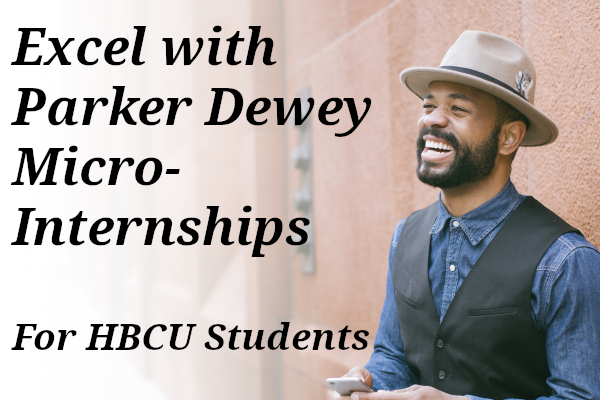6 Ways HBCU Students Can Excel with Parker Dewey Micro-Internships

Historically Black College and University (HBCU) students, there are opportunities to be grabbed and money to be made with Parker Dewey micro-internships. Yes, the paid opportunities are with legitimate businesses and for a decent amount of money per project (usually ~$300). No, its not a difficult process for HBCU students to create a Parker Dewey account and get started. Below, I'll share some tips that helped me succeed with Parker Dewey micro-internships.
Complete Your Parker Dewey Profile
Fill out everything in your profile, education, and work experience sections. Think of the personal statement as a written version of your personal pitch to hiring managers. If you don't want to show your picture in the profile, upload an image relevant to your skills. For example, a lock for cybersecurity specialists. Pay special attention to the "Affiliations" section which provides access to projects dedicated to smaller communities - military veterans, IBM SkillsBuild, particular HBCUs, other nonprofit organizations, etc.
Upload your resume in PDF format. I've heard nobody recommend using a federal resume format or also uploading a Curriculum Vitae (CV), so that's your choice to make. If you're not confident in your resume, ask your university career services department for a resume review. They should do so for free and be willing to sit with you and talk over recommendations. I'm no expert in resume writing. I'll just share that I've heard from multiple resume reviewers that you can't go wrong with the combination resume format.
Attend the Meetings and Request Profile Reviews
Parker Dewey holds monthly virtual "Student Office Hours" where they provide tips and student profile and application reviews on the spot. Be warned, this review is done in front of everyone. If that makes you uncomfortable, ask to email the host for a private response with tips for greater success. They may also provide resume reviews.
Keep Applying to Micro-Internships
It may take a few months before you're accepted for a micro-internship. Keep applying. That gives you experience with answering common questions like "why should we choose you?" Also, even if you're not accepted for a project, the submission itself could lead to other networking and paid opportunities with business.
Read Feedback from Completed Micro-Internships
In the "Completed" section of your Parker Dewey dashboard, you can view client feedback for every project you've finished. I've yet to see this feedback affect future opportunities, but it can be helpful for professional development. Request that every project manager you work with provides feedback personally or within Parker Dewey to assist in your growth.
Create a Portfolio
Create a page somewhere that showcases your skills and projects, especially if you're an HBCU student ambassador (e.g., IBM HBCU ambassador). I list companies I've worked with, Credly badges, and relevant blog posts on my portfolio.
You don't need a web hosting plan or web development skills to create a decent portfolio. Depending on your goals, it may be better to create one with GitHub, an art gallery site, or a software-as-a-service (SaaS) solution like Squarespace. Make sure your LinkedIn profile is up to par as well.
Spread the Word with HBCU Students
Sharing this info with classmates and HBCU student organizations is the easiest way to support HBCUs. Of course, it never hurts to support HBCU news platforms and rock HBCU merch from Black-owned businesses. But all HBCU students benefit from more opportunities to enhance their skills, resume, and network. This was arguably my greatest contribution to Norfolk State University (NSU).
I want to be upfront about this. With this being election year in the US, between Project 2025, "Trumpism," and "white boy summer," you may receive criticism for prioritizing the HBCU community. If you (Black American HBCU students) ever feel discouraged, reach out to your peers (including student orgs), college faculty and stuff, and HBCU alum you trust. My contact methods are below.
#HBCUStrong
Tags: black-community, college, hbcus, professional-development





